|
|
|
Sort Order |
|
|
|
Items / Page
|
|
|
|
|
|
|
| Srl | Item |
| 1 |
ID:
181635
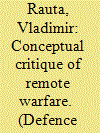

|
|
|
|
|
| Summary/Abstract |
This paper presents a conceptual critique of “remote warfare.” It argues that “remote warfare” is more of a trendy term than a robust concept. In support of this assessment, this paper makes two arguments. First, that there is a lack of clarity in the debate over what “remote warfare” is: namely, the literature is yet to explain what it entails. Second, that because of this lack of definitional specificity, we also lack an account of its analytical value: what intellectual leverage does it hold over existing terms making similar claims? The article discusses these points by expanding on the notion of “semantic field,” which it uses to assess how “remote warfare” contributes and is shaped by the broader conceptual confusion in the study of contemporary war and warfare.
|
|
|
|
|
|
|
|
|
|
|
|
|
|
|
|
| 2 |
ID:
191603


|
|
|
|
|
| Summary/Abstract |
External state support to non-state armed groups is commonly seen as a direct relationship between a state sponsor and a rebel group. But powerful states often use third-party states as conduits of military aid. These intermediary states are secondary, subordinate principals that are part of extended chains of “dual delegation.” Because intermediaries are likely to have their own separate agendas, powerful states often face a double principal-agent problem when providing material support to rebel groups. The difficulties and problems associated with controlling the agent are reflected in the relationship between the principal and the intermediary. States need to identify the alignment of interests at an early stage, or risk strategic failure. There are two ideal types of intermediaries—dealers and brokers. Case studies of the United States’ support to the Mujahideen in Afghanistan and to UNITA in Angola (channeled through Pakistan and Zaire, respectively) demonstrate that intermediaries affect the provision of external support. States engaging in counterterrorism need to look beyond sponsors of terrorism and explore the role of all states involved in the process of conflict delegation. That states use intermediaries when providing support to non-state armed groups indicates that holding states accountable for violating the nonintervention principle under international law should be reconsidered.
|
|
|
|
|
|
|
|
|
|
|
|
|
|
|
|
| 3 |
ID:
177754
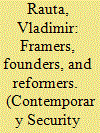

|
|
|
|
|
| Summary/Abstract |
The rapid expansion of the proxy war literature invites an examination of its advances and developments. This article’s aims are threefold. First, to assess proxy war literature with a view to understand how it has progressed knowledge. Second, to map the field’s effort to cumulate knowledge. Third, to think creatively about the future directions of this research agenda as it addresses a problem no longer at the periphery of contemporary security debates. This article proposes a novel categorization of the evolution of our thinking about proxy wars across three “generations”: founders, framers, and reformers. Following on from this, it provides an assessment of the literature’s assumptions in order to show what remains, or not, under-studied. In doing so, it makes a case for a historiography of the idea of “proxy war,” and one for embedding strategy in analyses of wars by proxy.
|
|
|
|
|
|
|
|
|
|
|
|
|
|
|
|
| 4 |
ID:
181661
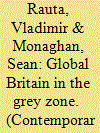

|
|
|
|
|
| Summary/Abstract |
The United Kingdom’s integrated defense and security review put “grey zone” or “hybrid” challenges at the center of national security and defense strategy. The United Kingdom is not alone: The security and defense policies of NATO, the European Union, and several other countries (including the United States, France, Germany, and Australia) have taken a hybrid-turn in recent years. This article attempts to move the hybrid debate toward more fertile ground for international policymakers and scholars by advocating a simple distinction between threats and warfare. The United Kingdom’s attempts to grapple with its own hybrid policy offer a national case study in closing the gap between rhetoric and practice, or stagecraft and statecraft, before an avenue of moving forward is proposed—informally, through a series of questions, puzzles, and lessons from the British experience—to help international policy and research communities align their efforts to address their own stagecraft-statecraft dichotomies.
|
|
|
|
|
|
|
|
|
|
|
|
|
|
|
|
| 5 |
ID:
179363


|
|
|
|
|
| Summary/Abstract |
This article presents a definitional structure for the notion of ‘proxy war’ organised around three components: (1) a material-constitutive feature, (2) a processual feature and (3) a relational feature. First, the article evaluates the multiple usages of the term of ‘proxy war’ in light of its contested character. Second, it proposes a way of making sense of the literature’s conceptual turmoil by analysing the different attempts at defining the notion. To this end, it adds an important link to the methodology of concept analysis, namely the ‘semantic field’, which it re-introduces as a heuristic to identify ‘military intervention’ as a root concept for defining proxy wars. The article does so by identifying a type of semantic relationship between ‘proxy war’ and ‘military intervention’, namely sub-type inclusion.
|
|
|
|
|
|
|
|
|
|
|
|
|
|
|
|
| 6 |
ID:
173320
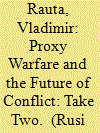

|
|
|
|
|
| Summary/Abstract |
While proxy wars have been around since time immemorial, the last decade of conflict has seen a rise in their strategic appeal. In the same way that sub-state violence captured the attention of policymakers and academics at the end of the Cold War, proxy wars are now a core feature of the contemporary and future strategic and security environment. Vladimir Rauta argues for a relocation of proxy wars by conceptualising them as strategic bargains waged on more complex grounds than risk avoidance, cost efficiency and deniability. He identifies two types of strategic goals sought through the employment of proxies: coercing and coping with an adversary, the differences of which are presented by contrasting the rationale for the US decision to support Syrian rebels against President Bashar Al-Assad with the Iranian strategy of proxy war in Syria.
|
|
|
|
|
|
|
|
|
|
|
|
|
|
|
|
| 7 |
ID:
181629
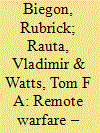

|
|
|
|
|
| Summary/Abstract |
The debates around remote warfare have grown significantly over the last decade, leading to the term acquiring a certain buzz in the media, think-tank, and policy discourse. The lack of any serious attempt to reflect and take stock of this body of scholarship informs the scope of this special issue, in general, and of this article in particular. This paper addresses this former gap and, in doing so, serves a threefold purpose. First, to provide a state-of-the-art review of this emerging debate. Second, to both categorise what properties make a buzzword and to make the case for why existing remote warfare scholarship should be approached in this way. Third, to introduce how the various contributions to this special issue extend the debate’s conceptual, theoretical, and empirical parameters.
|
|
|
|
|
|
|
|
|
|
|
|
|
|
|
|
| 8 |
ID:
163100
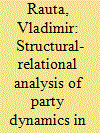

|
|
|
|
|
| Summary/Abstract |
Proxy wars are still under-represented in conflict research and a key cause for this is the lack of conceptual and terminological care. This article seeks to demonstrate that minimising terminological diffusion increases overall analytical stability by maximising conceptual rigour. The argument opens with a discussion on the terminological ambivalence resulting from the haphazard employment of labels referencing the parties involved in proxy wars. Here, the article introduces an analytical framework with a two-fold aim: to reduce label heterogeneity, and to argue in favour of understanding proxy war dynamics as overlapping dyads between a Beneficiary, a Proxy, and a Target. This is then applied to the issues of defining and theorising party dynamics in proxy wars. It does so by providing a structural-relational analysis of the interactions between the above-mentioned parties based on strategic interaction. It presents a tentative explanation of the proxy relationship by correlating the Beneficiary’s goal towards the Target with the Proxy’s preference for the Beneficiary. In adding the goal-preference relational heuristic, the article advances the recent focus on strategic interaction with a novel variant to explanations based on interest, power, cost–benefit considerations or ideology.
|
|
|
|
|
|
|
|
|
|
|
|
|
|
|
|
| 9 |
ID:
170251
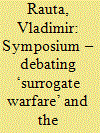

|
|
|
|
|
| Summary/Abstract |
In two separate addresses to the United Nations General Assembly, former United States (U.S.) President, Barack Obama, linked the religious wars of the Middle East to the dangers of proxy wars. In September 2014, he acknowledged the long history of religiously motivated wars, and invited the international community to take note of “the destruction wrought by proxy wars and terror campaigns between Sunni and Shia across the Middle East” (Roberts 2014). Two years later, Obama reiterated his earlier concerns warning that “across the region’s conflicts, we have to insist that all parties recognize a common humanity and that nations end proxy wars that fuel disorder” (Oakford and Salisbury 2016).
|
|
|
|
|
|
|
|
|
|
|
|
|
|
|
|
| 10 |
ID:
179099


|
|
|
|
|
| Summary/Abstract |
This article presents a typology of armed non-state actors in hybrid warfare: proxy, auxiliary, surrogate and affiliated forces. By focusing on the kinetic domain of hybrid warfare, the article offers a corrective to a debate that has so far ignored variation in roles and functions of non-state actors and their relationships with states and their regular forces. As a denominator, ‘hybrid’ identifies a combination of battlespaces, types of operations—military or non-kinetic—and a blurring of actors with the scope of achieving strategic objectives by creating exploitable ambiguity. However, there has been a disproportionate focus on what hybrid war supposedly combines across battlespaces and domains (socio-political, economic, informational), at the expense of who and how. Using the Ukrainian crisis as a theory-building exercise, the article suggests a four-category schema that identifies non-state actor functions as a tool to better represent the complex franchise of violence that is found nested next to non-military operations in hybrid activity. In so doing, the article speaks to a call for better conceptualization the role of non-state violent actors in civil war, in general, and in hybrid warfare, in particular.
|
|
|
|
|
|
|
|
|
|
|
|
|
|
|
|
|
|
|
|
|